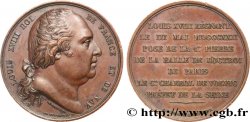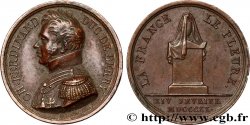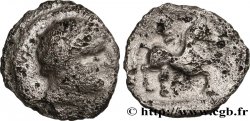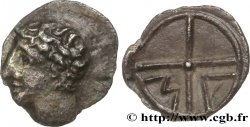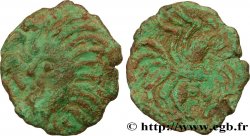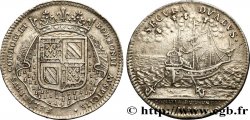Live auction - fme_888640 - LOUIS XVIII Médaille, Général La Fayette
You must signin and be an approved bidder to bid, LOGIN TO BID. Accounts are subject to approval and the approval process takes place within 48 hours. Do not wait until the day a sale closes to register. Clicking on "BID" constitutes acceptance of the terms of use of cgb.fr private live auctions.
Bids must be placed in whole Euro amounts only. The sale will start closing at the time stated on the item description; any bids received at the site after the closing time will not be executed. Transmission times may vary and bids could be rejected if you wait until the last second. For further information check the Live auction FAQ
All winning bids are subject to a 18% buyer’s fee.
All winning bids are subject to a 18% buyer’s fee.
| Estimate : | 150 € |
| Price : | 101 € |
| Maximum bid : | 101 € |
| End of the sale : | 13 February 2024 16:48:43 |
| bidders : | 2 bidders |
Type : Médaille, Général La Fayette
Date: 1824
Metal : copper
Diameter : 46,5 mm
Orientation dies : 12 h.
Engraver CAUNOIS François Augustin (1787-1859)
Weight : 47,61 g.
Edge : lisse
Puncheon : sans poinçon
Coments on the condition:
Très belle patine marron hétérogène, légèrement irisée au revers. Très légère usure sur certains hauts reliefs de l’avers. Des rayures sur la tranche
Catalogue references :
Obverse
Obverse legend : GENERAL - LAFAYETTE.
Obverse description : Buste du général La Fayette, en habit, à droite ; sur la tranche de l’épaule .1824. ; au-dessous signature CAUNOIS FRENCH..
Reverse
Reverse legend : THE DEFENDER / OF AMERICAN AND / FRENCH LIBERTY. / 1777-1824. / BORN IN CHAVANIAC, / THE 6 SEPTEMBER, / 1757..
Reverse description : Couronne de chêne, inscription au centre en sept lignes.
Commentary
Cette médaille a certainement été réalisée pour les États-Unis ; elle existe aussi en bronze doré ou en bronze argenté et en or.
Cette médaille commémore le voyage de La Fayette aux États-Unis le 13 juillet 1824. Collignon (La médaille au XIXe siècle et l’histoire) décrit ainsi ce voyage “Après avoir fait un triomphal accueil à Lafayette, qui était allé revoir le théâtre des exploits de sa jeunesse, le Congrès des États-Unis avait voté une résolution où il appelait Lafayette le champion de la liberté, le héros de la Révolution, l’ami et le compagnon de Washington, et il avait envoyé un navire de guerre le chercher en France. Le Vice-Président vint le recevoir à New-York. Il fut traité dans toutes les cités américaines avec les mêmes honneurs que s’il eut été le président d’une République Française. Les récits émouvants qui arrivaient d’Amérique apportèrent aux libéraux français une consolation, un encouragement et une espérance”. Lafayette effectue ce voyage avec son fils prénommé Georges Washington, 182 villes sont visitées entre 1824 et 1825. Le Congrès le remercie en lui faisant un don de 200.000 dollars (en récompense de l’argent qu’il avait avancé personnellement pour aider la Révolution américaine) et 12.000 hectares de terres en Floride. Il fut le premier étranger à s'adresser aux deux Chambres réunies du Congrès américain et son portrait figure dans la Chambre des Représentants. Il a été élevé à titre posthume, «citoyen d'honneur des États-Unis d'Amérique», un privilège rare qui n’a été accordé qu'à quatre reprises dans l'Histoire américaine.
Cette médaille commémore le voyage de La Fayette aux États-Unis le 13 juillet 1824. Collignon (La médaille au XIXe siècle et l’histoire) décrit ainsi ce voyage “Après avoir fait un triomphal accueil à Lafayette, qui était allé revoir le théâtre des exploits de sa jeunesse, le Congrès des États-Unis avait voté une résolution où il appelait Lafayette le champion de la liberté, le héros de la Révolution, l’ami et le compagnon de Washington, et il avait envoyé un navire de guerre le chercher en France. Le Vice-Président vint le recevoir à New-York. Il fut traité dans toutes les cités américaines avec les mêmes honneurs que s’il eut été le président d’une République Française. Les récits émouvants qui arrivaient d’Amérique apportèrent aux libéraux français une consolation, un encouragement et une espérance”. Lafayette effectue ce voyage avec son fils prénommé Georges Washington, 182 villes sont visitées entre 1824 et 1825. Le Congrès le remercie en lui faisant un don de 200.000 dollars (en récompense de l’argent qu’il avait avancé personnellement pour aider la Révolution américaine) et 12.000 hectares de terres en Floride. Il fut le premier étranger à s'adresser aux deux Chambres réunies du Congrès américain et son portrait figure dans la Chambre des Représentants. Il a été élevé à titre posthume, «citoyen d'honneur des États-Unis d'Amérique», un privilège rare qui n’a été accordé qu'à quatre reprises dans l'Histoire américaine.







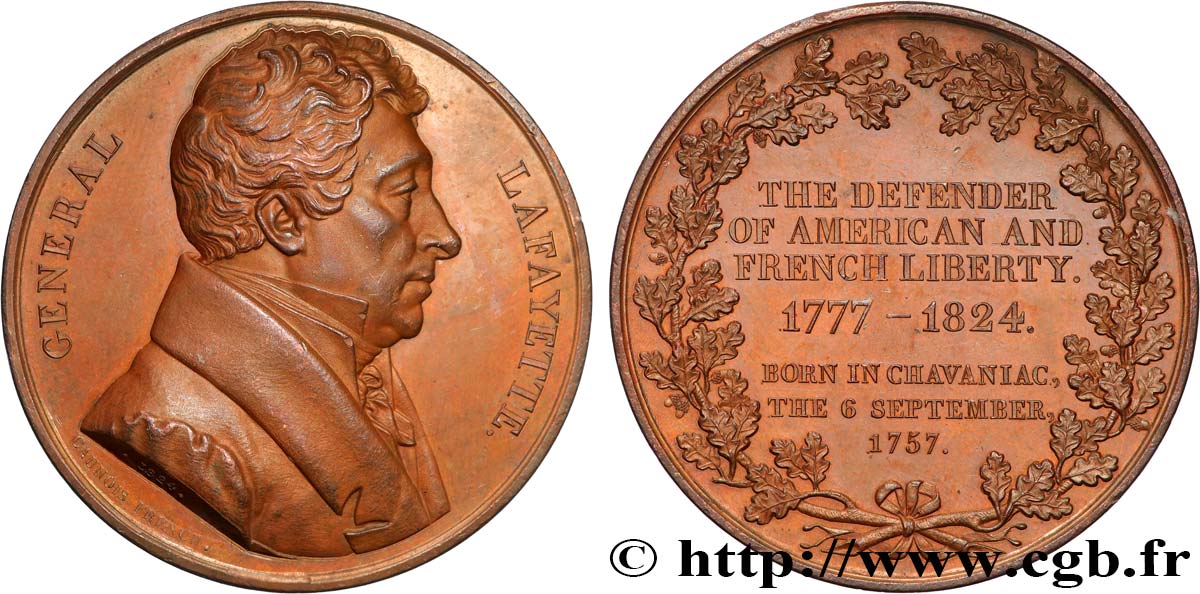
 Report a mistake
Report a mistake Print the page
Print the page Share my selection
Share my selection Ask a question
Ask a question Consign / sell
Consign / sell
 Full data
Full data